The Welsh Way - Inside the 'Harvard of coaching'
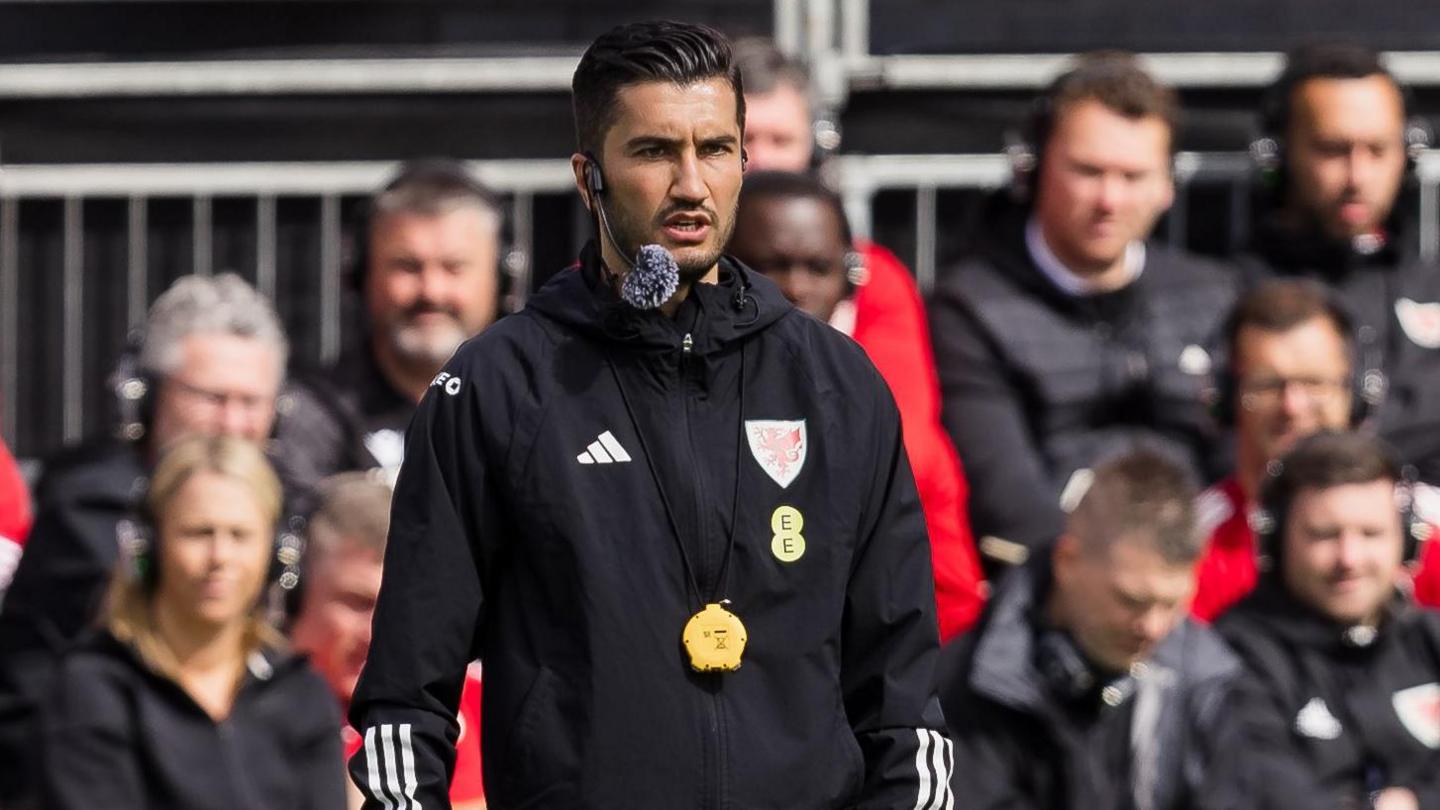
Nuri Sahin won league titles in Spain and Germany as a player and has already managed in the Champions League
- Published
Listen to The Welsh Way: Inside 'Harvard for football coaches' with Steve Crossman on demand with BBC Sounds
Gael Clichy puts on his virtual reality headset, gets up and walks around the room, the former Arsenal and Manchester City defender careful not to bump into two-time World Cup winner Brandi Chastain, who is wearing the same gear and trying to figure out how best to counter Brighton's press.
Yohan Cabaye, the ex-France and Newcastle midfielder, searches for a solution on the other side of the room, where Stoke's sporting director Jonathan Walters is pondering his next move.
Welcome to the Celtic Manor hotel near Newport, where the Football Association of Wales is holding some of its final sessions for the sport's highest coaching qualification, the Uefa Pro Licence.
This is what you need to manage at the top level, and this particular course attracts some of football's biggest names, as illustrated by a list of graduates that includes Thierry Henry, Yaya Toure, Roberto Martinez and Mikel Arteta.
The current crop are as diverse as they are recognisable, from former Borussia Dortmund and Liverpool midfielder Nuri Sahin to Wales manager Rhian Wilkinson, and from Caernarfon Town boss Richard Davies to his new friend, Nice captain and Brazil international Dante.
Thrown together two years ago, this group now "feels like a family", says Dante.
Having completed their B and A Licences, the class of 2025 are entering the closing stages of their Pro Licence and ready to take the next step on their burgeoning coaching journeys.
Granted rare and unlimited access, BBC Sport takes you behind the scenes on the course Sahin describes as the "Harvard for coaching".
Trendsetters - the FAW's 'innovative and creative' coaching course
From All Blacks rugby to training with the army
Having played and managed in the Champions League with the likes of Real Madrid and Dortmund, ex-Turkey international Sahin feels at home in elite football surroundings.
He also has experience of world-leading educational institutions, having studied sports management at Harvard Business School.
So when Sahin assesses the FAW's Pro Licence course, it comes from a place of authority.
"I've learned so much," he says. "This will prepare me not only for my coaching career but the rest of my life.
"I had this when I was in Harvard, and this is like Harvard for coaching.
"I've enjoyed every minute on this course, with these people. It feels special here. We've created a bond and I know we will be a group who will be connected for the rest of our lives."
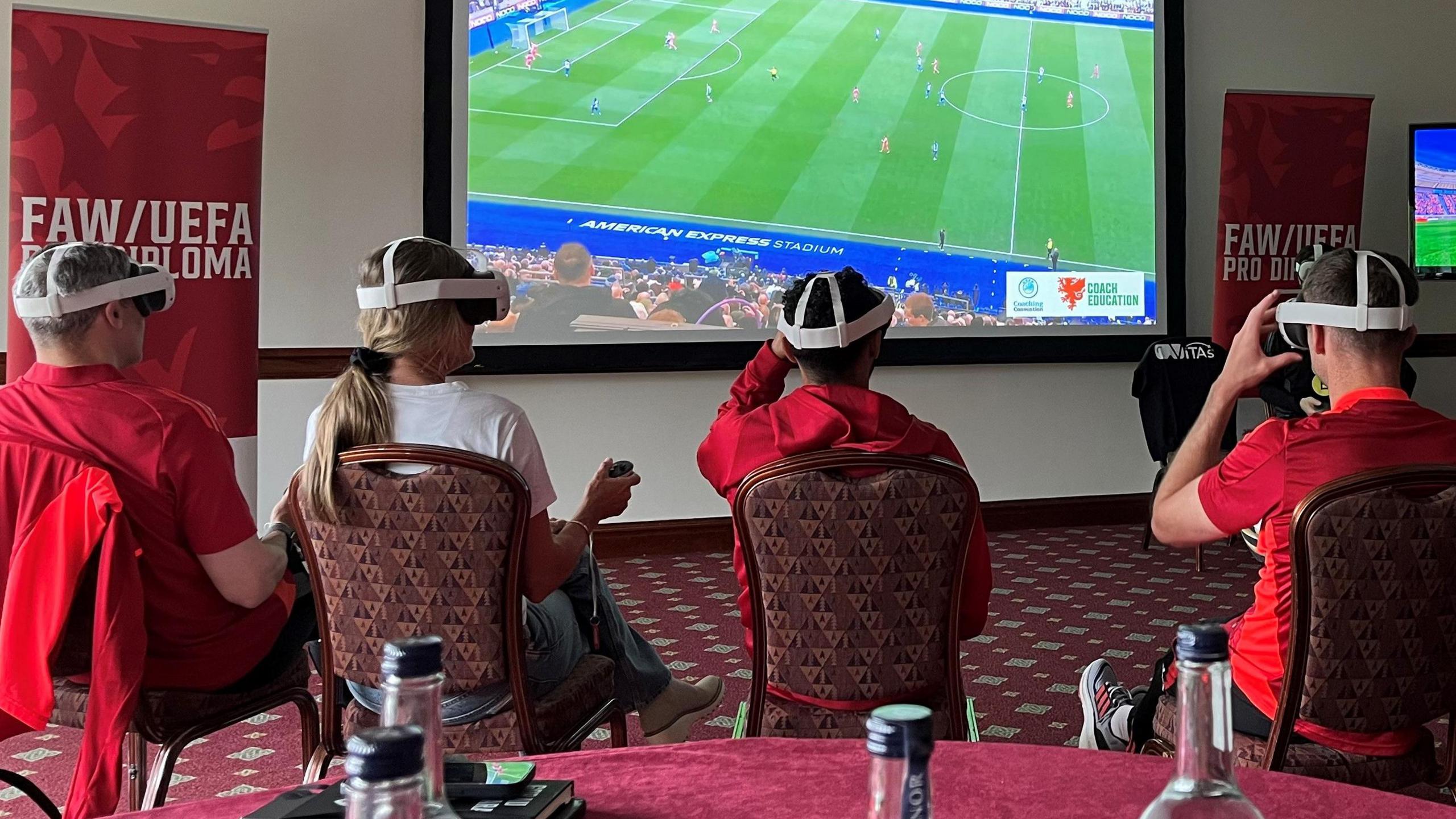
Jonathan Walters (left), Brandi Chastain (second left), Gael Clichy (second right) and Andy King get to grips with a virtual reality task
This is a rigorous course, which requires candidates to commit to long hours, both at home – which could be anywhere in the world – and during their contact periods with the FAW.
During this extended weekend in May, they are required to do practical tests and training sessions on the pitch at Dragon Park in Newport, while work at the nearby Celtic Manor includes the aforementioned virtual reality seminars, tactical theory tasks and individual presentations.
"I made my special report about the All Blacks," Sahin says. "For me it was important to study a team not in football, about the culture and living the culture. They are the best example of this and I have no clue about rugby.
"What I learned is the culture and protecting the country, the jersey, the values, being good people. I want to win with good people."
While the football knowledge required is extensive – and the technical detail granular – candidates are often taken out of their comfort zone on this course.
"We went on a trip to work with the army for three days where they deprived us of sleep and we had to do missions being super tired," says Clichy, a member of Arsenal's Invincibles of 2004.
"The food we had was in very small portions and you realise that you're affected by this, how you make a decision related to football.
"You could be in a very important game, you're losing 2-0, you had a plan during the whole week and then you find yourself behind, how do you cope with it? So that was a different way for us to learn how to deal with pressure."
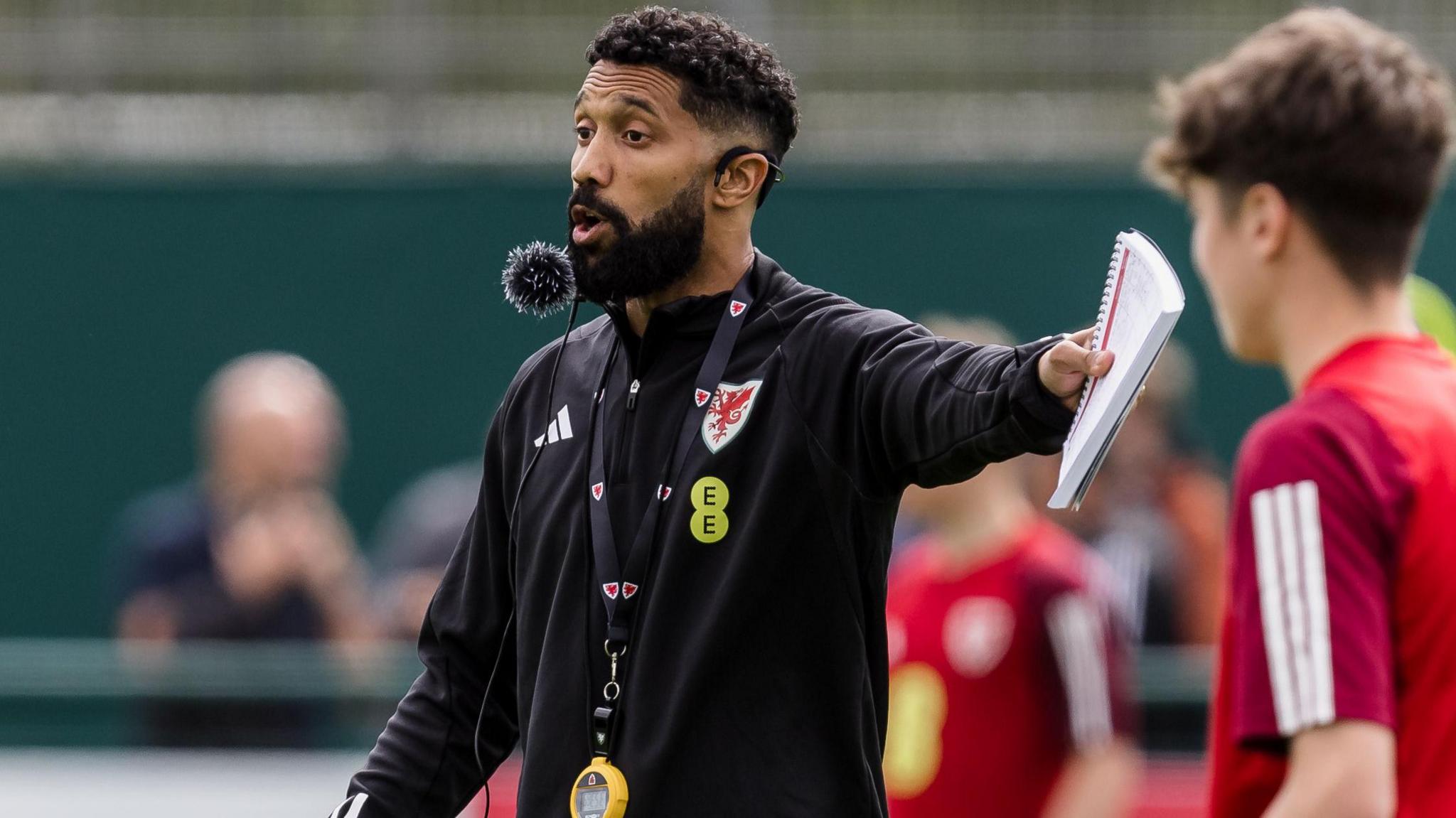
Former Manchester City left-back Gael Clichy is now assistant coach of France Under-21s
Sharing heartache, forming unlikely friendships
Tasks such as working with the army are levellers for this group.
Whether you have already played at the highest level, or managed semi-professional teams, there is a striking sense of equality here.
"People like to hear stories about Pep [Guardiola] and Arsene Wenger but I'm aiming to be a top coach," says Clichy.
"I know there's a big chance that I'm going to be starting at a lower level. And these guys, who started in amateur football and been in a job for the last 20 years, have got a lot to offer me because what I know, my career, is probably three or 5% of what football is.
"It's not real football, playing 20 plus years in a club like Arsenal and City. It's rare, and you have to understand it. So as a coach, if I'm lucky to start and to get there one day, that would be fantastic. But I know I'll have to start at the bottom and these guys can tell me how it is."
In a practical, footballing sense, there are countless valuable lessons these people can learn from each other.
On a more human level, the experience has been profound.
"Around the first couple of days, last March or April when we started the course, we had to do a presentation around the four Hs, with your four Hs being your history, your heartache, your heroes and your hopes," says Adie Harvey, who coaches Wales Under-16s boys.
"Everyone had to deliver that to the group, which was quite daunting really, with the level of expertise of people in the group. But it just flattened any hierarchy or ego among the group, and it really connected us.
"I took massive strength from listening to others and what they've gone through. We've all gone through some type of tragedy or heartache, so that really connected all of us and provided so much strength for us as a cohort."
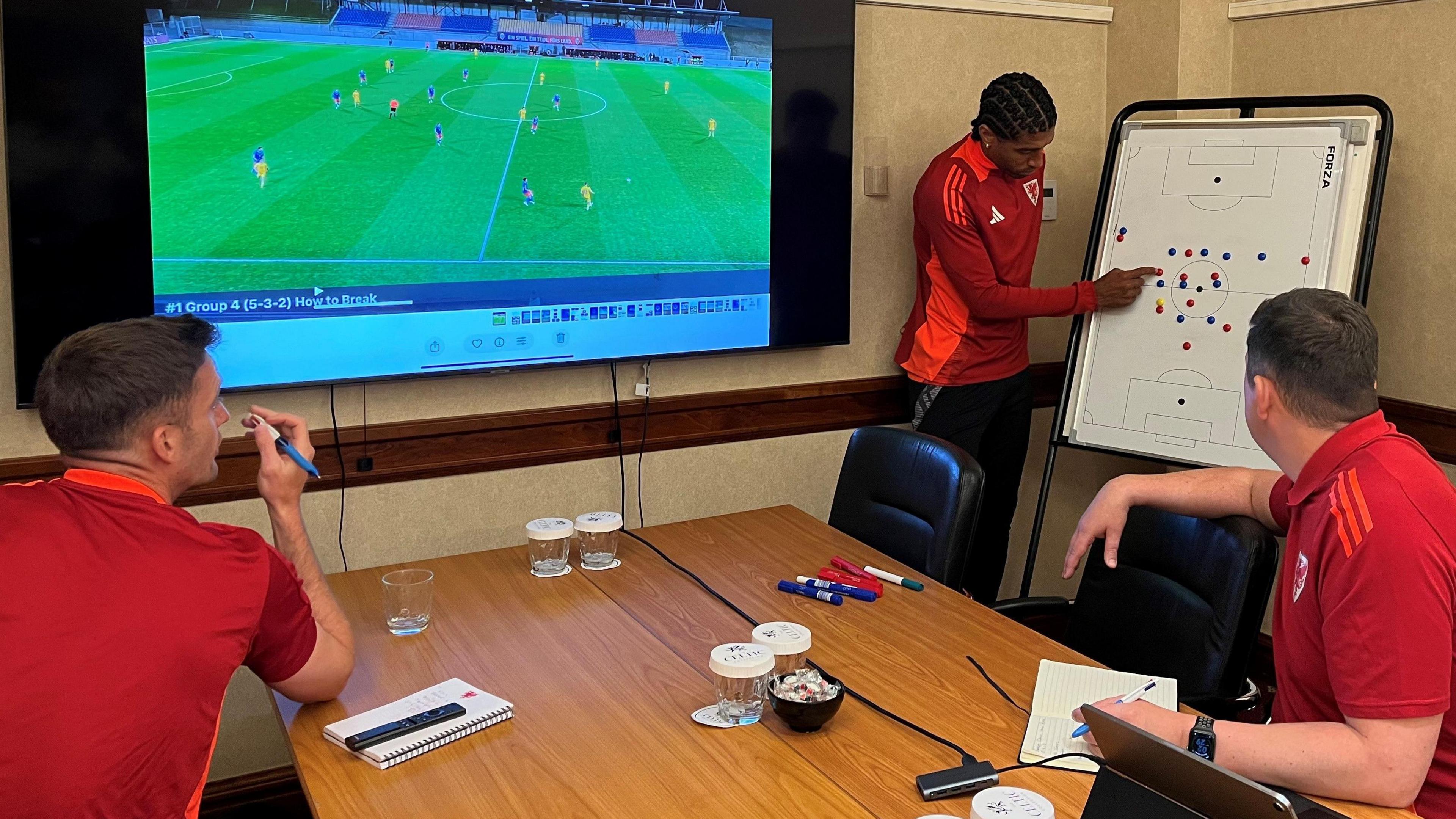
Dante (centre) and Richard Davies (right) work on a tactical task with former Wales and Leicester midfielder Andy King (left)
The result is that these are more than just working relationships, but real friendships.
"It feels like a family so we'll definitely keep in touch," says Davies, whose Caernarfon side are a semi-professional team in the Cymru Premier, Wales' top flight.
"We are like a family," Dante agrees. "We learn together, we do everything together.
"Richard is passionate. I was amazed to see the emotion he speaks with, and I think every coach needs this emotion inside."
Stood next to the towering former Bayern Munich defender, Davies adds: "For me, it's the knowledge Dante has. He's still playing at the highest level and what he's achieved in the game is unbelievable.
"To be able to have these conversations and tap into his mindset, how he sees the game, is so valuable for me. We're talking about someone who's managing in the Welsh Prem working with someone who's played in the Champions League and World Cup. Without this course, I'd never come across people like Dante."
These are enduring bonds which transcend football's natural order, as course graduates have demonstrated, with former Newport manager Mike Flynn still in a WhatsApp group with Henry and Arsenal boss Mikel Arteta.
Changing the game, from Chastain to Wilkinson
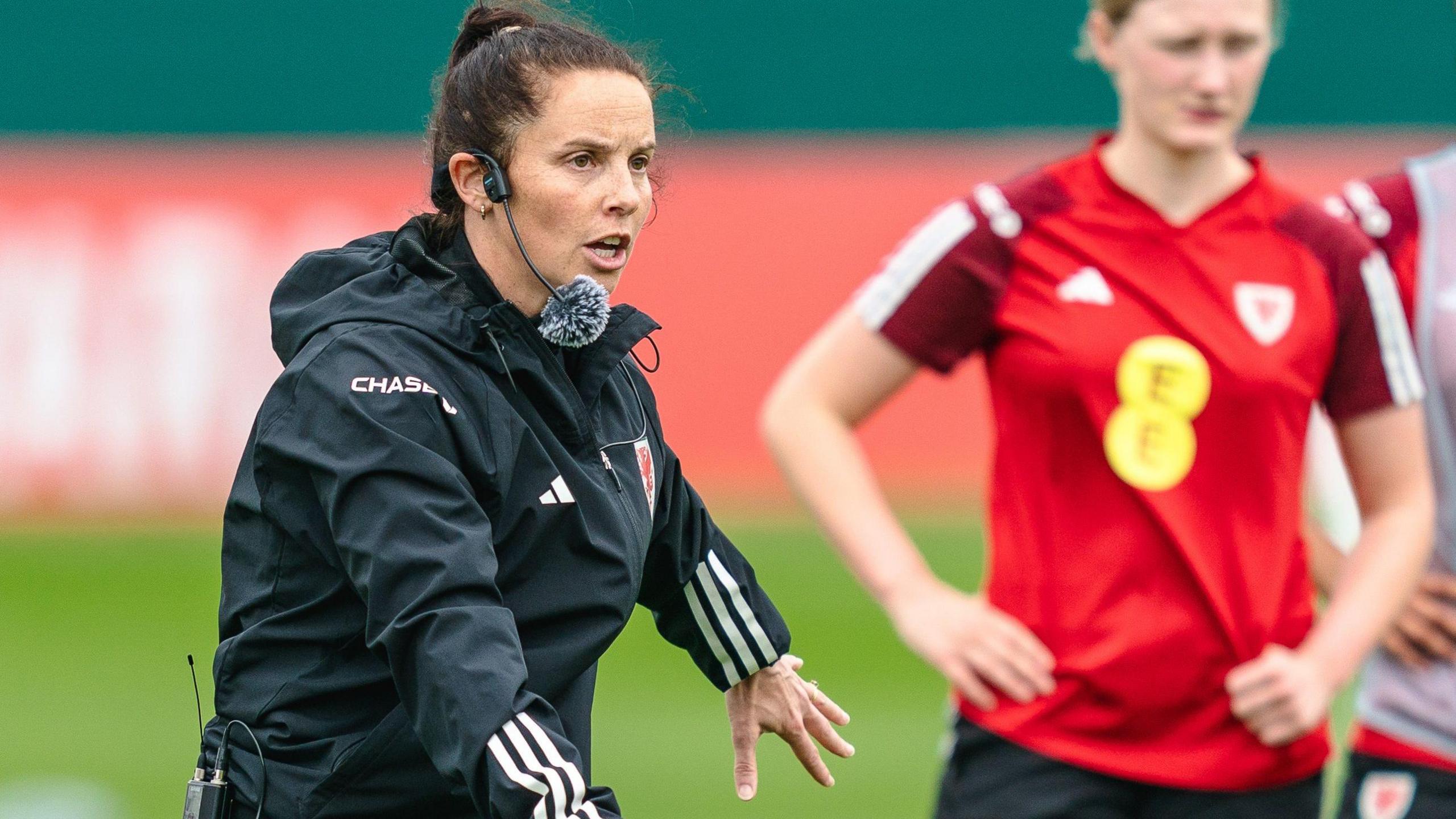
Rhian Wilkinson will lead Wales at their first women's major tournament this summer
While most here are only starting their coaching journeys, others are already fully-fledged managers.
One of those, Wales women's boss Rhian Wilkinson, is juggling her studies with preparations for this summer's Euros.
"It's a lot but I never want to miss these. Firstly, catching up with people but, equally, that excitement around learning. You never stop learning," Wilkinson says.
"Someone will say 'Well, Pep used to do this' or 'Jurgen Klopp would do this' and then you've got Brandi Chastain here as well. This is where we're moving things with the FAW.
"This is an environment where top men in the game want to come and learn but equally this has to be something that we start looking more seriously at with the women. This is a great step for the women's game.
"We can't lie. This is a very male-dominated sport and career. It is what it is. It's part of my job to make sure I continue to try and forge a path or show examples of women who can have a career in the game. And I can only do that because of women like Brandi Chastain, who did it before me."
Chastain's presence is a real fillip for the course. With two World Cups and two Olympic gold medals to her name, the 192-cap former United States international is one of the most recognisable faces in the women's game.
As well as delivering a speech at the FAW National Coaching Conference, Chastain takes part in the Pro Licence sessions with those on the course.
"I've been in football for 50 years and I know the lessons and the learnings that go out to young girls and women," she says.
"Activity through sporting endeavours allows young girls to find their voice and their power and their potential, and we know that young girls who participate in sports become women who lead.
"The statistics say that they go on to be executives and they become decision-makers and that's truly impactful for the world.
"I'm hoping there will be some fun stories in there but also some reminders about how critical good coaches are for young people. We're all here to help the game and make the game better so that's on both sides for the men and women."
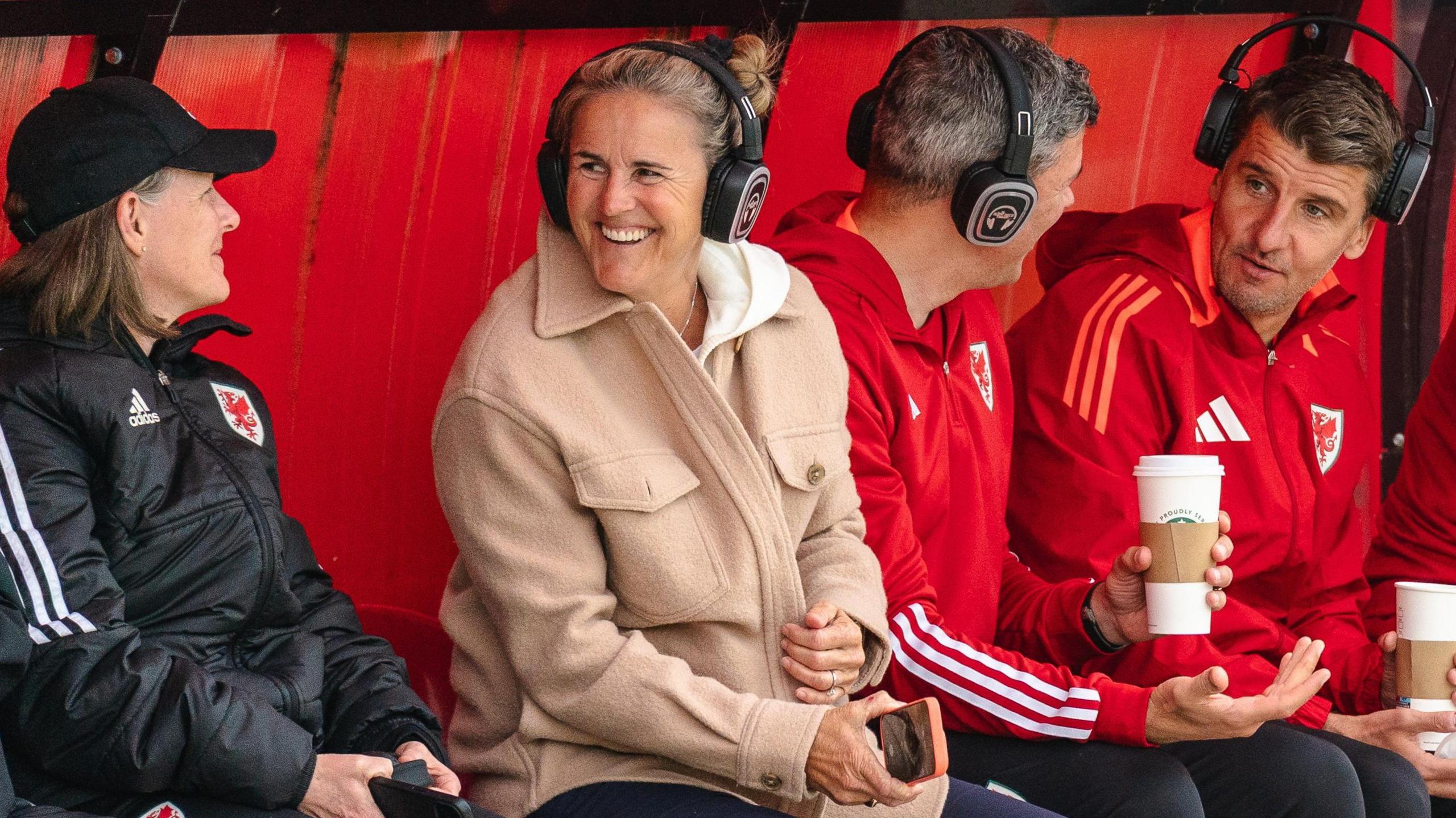
Brandi Chastain (second left) scored the winning penalty for USA in their shootout win over China in the 1999 World Cup final
Other guest speakers at the conference include Wales men's head coach Craig Bellamy and new Rangers boss Russell Martin, who present their footballing philosophies to a thronged hall of 100s at the Celtic Manor.
"This is my life," says Bellamy. "This game connects you with so many people and I'm always open to views from everyone. I look at everything like a puzzle and I try to steal ideas from other people to fit into a puzzle.
"Can you speak with passion? I was lucky I had a manager like Sir Bobby Robson who gave me that. Whether he was right or wrong, you would follow because he said it with such enthusiasm, you would play with that enthusiasm.
"I had experience of playing under a lot of managers, good and bad, and I really tried to learn off the good and bad, and self-reflection on myself, put myself back into the player, what worked for me, because I was a complicated person. I needed a 'why' and some coaches were scared of that, but I embrace it. I need to know. There's always a reason to everything I do."
The old school and the new Welsh Way
In their own distinct ways, Bellamy and Martin are flagbearers for the progressive trends of modern football: possession-based styles of play and building from the back.
Most young coaches want to follow that path, as you can see when watching this year's crop of FAW Pro Licence candidates working on and off the field.
But there is still room for the old school on this course.
On the final day, former Stoke manager Tony Pulis is invited to host a masterclass on set-pieces. It is a wet and windy Tuesday. This is meant to be.
Before his practical session on the pitch at a rain-lashed Dragon Park, he gives the Pro Licence group a presentation on his career – and it is pure gold.
Pulis is in his element as he reels off stories about his humble beginnings as a player and coach, before getting on to his various managerial tenures, complementing each piece of advice with at least a couple of entertaining anecdotes that could earn him a second career on the after dinner speaking circuit.
The 67-year-old Welshman has the room howling with laughter, and on a couple of occasions a giggling Dante asks for a little translation help from those next to him as he tries to decipher Pulis' broad Newport accent and industrial language.
Among the jokes are a number of useful lessons, as Pulis answers questions on various topics, from the help he got from his peers (Sir Alex Ferguson and Carlo Ancelotti get a mention) to balancing family life with the exhaustive travelling that comes with management.
Then he steps out on to the field to take the practical session with a group of young players, freezing in the rain as Pulis barks orders at them as if he was preparing them for a long-throw from Rory Delap.
"It's always nice to come back to Wales and Newport. It's a special place, this is my town," Pulis says.
"I loved playing football for my local club, or just on the streets. It's always nice to come and to be involved in football, helping people starting out in their careers.
"Set-plays have always been an important part of football and I think they've been undervalued. Mikel [Arteta] doing it with Arsenal, such a big club not just in England but on the world stage, has brought it to the fore again.
"I've had such a tremendous career and the world's changed, the game's changed. My first training session at Gillingham, we had to take the goals off the main pitch and take them on a tractor to a park and train there with people and their dogs walking past. Then you look at this and the facilities we've got today… it's the greatest sport in the world and it's our sport."
Listening as intently to Pulis as the fledgling coaches – and laughing just as hard at the jokes – at the back of the room is the man who oversees the course, Dave Adams.
As the FAW's chief football officer, Adams is responsible for the men's and women's game at all levels in Wales.
He appointed both senior national team head coaches last year and, on top of his work in developing Welsh football, he leads the Pro Licence course.
"I'm standing on the work of other people in some respects. Osian Roberts [former FAW technical director] did a great job in creating a programme which was world-class," says Adams.
"What I tried to do with it when I started in 2019 was to go into the market and speak to head coaches because, fundamentally, you want a course that reflects the needs of head coaches, which are really complex and multi-faceted. It's very much reality-based learning. We don't want things to be abstract because coaching is a vocational skill.
"We get close to 400 applicants for 20 [Pro Licence] places every two years. It's highly competitive. We've got to try and support our Welsh coaches like Chris Gunter and people who are working for our national association. But equally, we recognise that by having people like Nuri Sahin and Mikel Arteta, Chris Wilder, Roberto Martinez, Steve Cooper before that – the names are extensive – they bring a different lens and, as much as we help them, they actually help us as well.
"They've coached and worked at the highest level. There's a recognition on our side that when we bring people like that, it's also about taking from them, and that helps us grows an association. We learn new things, which we can apply to our programmes or our national teams, and that helps us grow as well."
At the heart of the FAW's work is the concept of the Welsh Way, an ethos underpinning everything from the elite level to grassroots - a vision for football in Wales, how to develop the game and foster its sense of national pride.
"It's our mantra, Together Stronger. In any department, being small, being agile, being dynamic and everyone feeling a part of something is really important," Adams adds.
"In any high-performance coaching environment, that sense of togetherness is really important. Whether you're the head coach or the masseur or the chef, you've all got a vital part to play and got to buy into the vision of the head coach.
"It's important we have that mantra and it drives everything we do. Why should we dream small? Dream big. We're a small country but we've got incredible talent. We're interested in the small margins and that's what gives us a competitive advantage at the highest level."